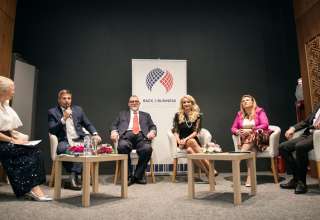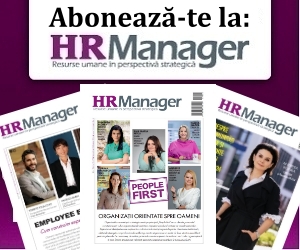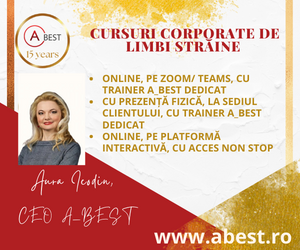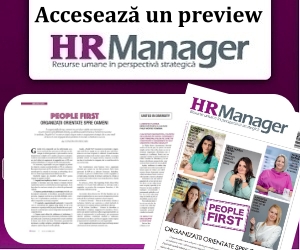
By Dr. Leslie Szamosi
Our region is facing so many crisis issues these days and we are spending nearly all waking hours just trying to keep our respective people ready and energized – some call it Survival. Yet, while we concern ourselves with the present we also need to keep our eyes on the future (short, medium, and long-term).
Pressing issues on the current HR Agenda
There are a number of pressing issues on the current HR agenda that we need to deal with including: managing Millennials, brain-drain, talent management, utilizing social media in HR and many many more. Yet, there is an issue that those outside our profession feel that is even more critical. Please remember not to ‘kill’ the messenger!!! Also, please, remember, I said those people OUTSIDE our profession, inside our organizations, are talking about!!
Over the last ten years, through the Laboratory of Strategic People Management, we have been undertaking seminars throughout the region on HR and its impact on organizations. When we talk to people in the profession we get a sense of euphoria, of pride, of high job satisfaction as we hear about best practices and what organizations are doing to ‘energize’ and drive success. Yet, whenever we start to ask non-HR professionals about HR there is always a collective ‘groan’ and then the ‘waterfall’! You hear everything (much of which I have to restrict from writing due to profanity) from: ‘HR does not understand our business” to “HR does not understand what we need” to “I have no idea what these people are doing” and so on!! And, it has always puzzled me, with all of the things that we do, on a daily basis, why is HR so poorly perceived and thought of? Why is there such a perceptual ‘gap’ between what we say we are doing and what others believe about us?
They are working in ways that are vastly different than in the past
First, are the ‘non-believers’ (non-HR) correct? To a certain extent they are! Our businesses have been extremely complex ‘organisms’ over the last decade. The speed of change, the way business has evolved, the consolidations that have taken place have influenced the workforce; they are working in ways that are vastly different than in the past. Just think about how much cost cutting has been undertaken and how much more effectively our workforces have to operate in order to keep pace within the needs of business. Do we in HR understand these particular nuances of business today, at the ‘shop’ level? Can we, or do we, ‘talk’ the language of our ‘new’ organizations?
Secondly, at the ‘believers’ (HR) correct? Again, to certain extent they are! The profession has come a long way in this region over the last ten years. We have seen a strong formalization of HR within the fabric of organizations. We have the strength of associations and professional bodies like the HR Club or Romania and the European Association for People Management (EAPM) embedded in the country. But are those working in it truly business driven and oriented towards their organization from a strategic HR point of view? Do those working in our HR truly understand their profession or do they simply understand their ‘job’?
There are likely two points of attack that will aid us, and our profession, immensely inside our organization and in the country as a whole. First, we need to do a much better job of what is termed ‘internal marketing’ to those that we serve. Secondly, we need to upgrade more people inside HR departments to professional status.
We are not simply an administrative function but an active ‘value add’ provider to our organizations
Inside our organizations we need to make a concerted effort to ensure that everyone, including ourselves for that matter, knows what HR is doing on a daily basis to serve and support the workforce; we are not simply an administrative function but an active ‘value add’ provider to our organizations. This type of discussion and information driven forum needs to take place not from a point of “salaries are being paid this week” but to the strategic input we are having to the business itself.
For example, sharing best practice information from other organizations (or our subsidiaries) and gaining input and working with our staff to see its viability for us; letting our staff know when others see us as a benchmark. Being more integrated into the day-to-day functioning of our organizations and being an active provider of input to business, departmental, and work group strategy. Active engagement, promotion, and support of our organizations as only we in the HR profession can do is paramount. Wherever possible the quantification of our value-add should be open and transparent as it is for other departments and work groups.
We need people who understand the business
Within our collective HR departments we need to increase our overall level of professional development and qualification. In order to push away from strictly an administrative function we need people who understand the business AND understand HR, its functions, and how to leverage value through the function to others in the organization. There are various definitions of professional status but the most applicable is one in which involves prolonged training and education and a formal qualification that has tested skills in the area. Perhaps we need to identify staff within our organizations to encourage them into the profession – they bring the business acumen and we bring the HR prowess. When we recruit externally we should be looking to add to the professionalization of our department and not simply finding someone who can do the job.
We designed a MBA with specialization in HR
In order to address the later issue, one of the things we at the International Faculty of the University of Sheffield noticed was a lack of postgraduate level programs specializing in the area of HR and even fewer incorporating either a European or international perspective. To address this we designed a MBA with specialization in HR to assist in the development and understanding of the nuances of today’s ever-changing business environment while also expanding HR specific knowledge and orientation. The program aims to assist in the development of people in, or aspiring to, the HR profession who require a more holistic, comprehensive understanding of business combined with up to date and cutting edge, internationally driven, HR focus along with personalized leadership coaching and regional networking opportunities.
A strong and effective hr department is key to organizational success both in the short and long-term
HR in this region has come a long way and we still have a way to go. But, those of us in the profession are some of the most dedicated individuals who represent the future for our organizational development. Although the finance people may disagree, in my view, a strong and effective HR department is key to organizational success both in the short and long-term. Collectively, we need to ensure that this occurs and we need to get out there are let others know the value we add to our companies to counteract the argument that we are simply a cost centre. When that battle is won, HR will truly achieve professional status in this region.
 Dr. Leslie Szamosi, Sheffield MBA Senior Lecturer
Dr. Leslie Szamosi, Sheffield MBA Senior Lecturer
Dr. Szamosi is a Senior Lecturer and the Academic Director of the MBA program at University of Sheffield International Faculty, City College and a Founder and Co-Director of the Laboratory for Strategic People Management. He is a member of the International Faculty of the Association of MBAs (AMBA) and is regular evaluator and assessor of European Union funded projects. He has worked both in the private and public sectors in Canada. Dr. Szamosi has a Ph.D. in Organisational Behaviour and Human Resource Management from the Carleton University, Canada.























